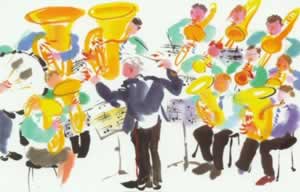Fr Kelly Concludes
To conclude this book on prayer I would like to draw attention to the fact that prayer is the first and most important duty of any human being. It fulfils the main purpose for which human beings were created.
Prayer is the first and most important duty of any human being
In order to develop this point we need to ask ourselves two questions.
(1) what do we mean by prayer?
(2) why were human beings created?
We have defined prayer many times as loving communion with God. Why were human beings created? Aquinas points out innumerable times in his Summa Theologica that charity is the ultimate purpose of our lives as human beings. We were created ultimately to love God here and hereafter. Our ‘ultimate purpose’ must not be understood as a state we achieve only in heaven. Each of us has the duty to realise that purpose in the present moment. Aquinas constantly reminds us of our ultimate end and he sees all things in relation to that end. This is true also of Ignatius of Loyola as we will see later. Aquinas wants us to keep our eyes constantly on the ultimate goal of charity.
But charity or loving God is impossible without prayer. Genuine prayer by definition is ‘loving communion with God.’ In prayer we exercise affective love and if this grows strong it will produce a harvest of virtuous good works as Paul teaches in 1Cor. 13. Hence true prayer turns out to be the most practical activity that one can imagine. Prayer ensures that all things will be done in love. Activity without love, according to Paul, is sounding brass and tinkling cymbals. We should remember also that prayer, without good works, is not genuine prayer. Our affective love is proved above all, by sacrificing our own interests so as to please God. Affective and effective love complement and enrich one another.
Vatican II offers us another slant on our ultimate end. It teaches us that Jesus gives us the Holy Spirit to lead us to the fullness of love or to our ultimate end (L.G. 40). Our ultimate end is primarily affective love, which is exercised in true prayer. We are justified in deducing that the Holy Spirit leads everyone to pray, and thereby leads us to loving communion with God. In this way we realise our ultimate end. Paul is saying the same thing when he tells us that ‘the love of God is poured forth in our hearts by the Holy Spirit who is given to us’ (Rom. 5, 5). The Holy Spirit will lead us to both affective and effective love.
Another way of looking at our ultimate end is to point out that heaven starts here and reaches its perfection in the world to come. The Catechism of the Catholic Church defines hell as the exclusion of oneself from communion with god and the saints. This obviously commences in this life and carries over into the next. We are justified in saying that heaven is the opposite. It is loving communion with God here and it reaches perfection in heaven. Genuine prayer, which is loving communion with God, is already the commencement of heaven.
In this context one is reminded of St. Therese, who once said, ‘I don’t know what extra happiness I will have in heaven since I already enjoy union with God.’ She realised that her heaven had already begun. While on earth she had already attained a high degree of charity which was her ultimate end.
We are reminded also of the words of Jesus. ‘This is eternal life knowing the one true God and Jesus Christ whom he has sent.’ In John’s gospel ‘knowing God’ means loving communion with God. ‘Eternal life’ is the experience of this communion whether here or hereafter. Prayer is the activity that nourishes, deepens and expresses this loving communion which is ‘eternal life.’
Is it any wonder that Mother Teresa of Calcutta teaches that prayer is the way to holiness?
Why? Because holiness is identical with love and above all with affective love, which is the root from which all the virtues spring up in the Christian life.
If, due to persevering prayer, our affective love of God is strong and unshakeable every other element in the Christian life will fall into place. That is why Arrupe can assure us that if we fall in love and stay in love all our problems as Christians will be solved.
We saw above that the Holy Spirit is leading each one to the fullness of love. God has created in us a hunger for himself. ‘The eye is not filled with seeing nor the ear with hearing.’ John of the Cross teaches that the soul is an infinite capacity for God. We sing daily in the Divine Office that the human heart is made for the Blessed Trinity. Augustine assures us that the human heart is made for God and it does not rest until it rests in God. All these sources draw attention to our deepest need, our need for God.
He stands at the door and knocks
 But there is also the other side of the coin. Not only do we have a desperate need of God but, for some inexplicable reason, God wants to fill this need. He wants loving communion with us. He stands at the door and knocks (Rev. 3, 20). If by prayer we open the door he will come in and there will be loving communion between God and us. John of the Cross assures us that God is searching for us far more than we are searching for him. We respond to God especially by prayer and self-sacrifice.
But there is also the other side of the coin. Not only do we have a desperate need of God but, for some inexplicable reason, God wants to fill this need. He wants loving communion with us. He stands at the door and knocks (Rev. 3, 20). If by prayer we open the door he will come in and there will be loving communion between God and us. John of the Cross assures us that God is searching for us far more than we are searching for him. We respond to God especially by prayer and self-sacrifice.
Prayer, since it generates affective love, will urge us to live not for ourselves but for him who died for us. Out of love we will sacrifice ourselves so as to please God. Furthermore, the grace to do this comes from our prayer. This again leads us to the conclusion that prayer is the source of all holiness and of affective love.
In this whole context of realising our ultimate end by prayer I would like to draw attention to the teaching of Ignatius of Loyola. He reminds us that we are created to praise, reverence and serve God (namely, to love God). All other things are created to enable us to achieve this end of loving God. It logically follows that we must only use things to the extent that they will help us to attain this goal. We must rid ourselves of them in so far as they hinder us from loving God. If we are not sure whether they are a help or a hindrance we should remain indifferent to them.
Like Aquinas, Ignatius sees love of God as the ultimate goal, in the light of which all things must be evaluated. But this love of God is primarily affective and dependent on the practice of prayer. Ignatius prescribed long periods of prayer for the Jesuits. Most religious orders since his time have continued to stress in their constitutions the importance of personal mental prayer. Once again we are left with the conclusion that the most important activity of a human being on this earth is loving communion with God in prayer. Hence prayer is a supreme value.
I have said everything
To bring our subject to an end let us give the last word to St. Therese. One night she was sitting up awake in bed. Her sister, Celine, said to her, ‘why aren’t you sleeping?’ Therese replied, ‘I cannot sleep; I’m praying.’ Celine asked, ‘what are you saying to Jesus?’ ‘Nothing’, says Therese, ‘I’m just loving him.’ She realised that prayer and love are one and the same activity. On the day before she died she was asked for some final advice on the spiritual life. The dying saint replied weakly, ‘I have said everything. Love alone matters.’ She might have said - ‘prayer alone matters.’



 Entries(RSS)
Entries(RSS)